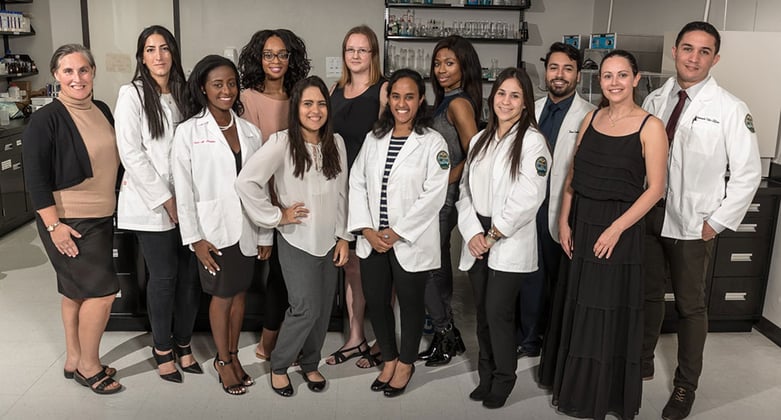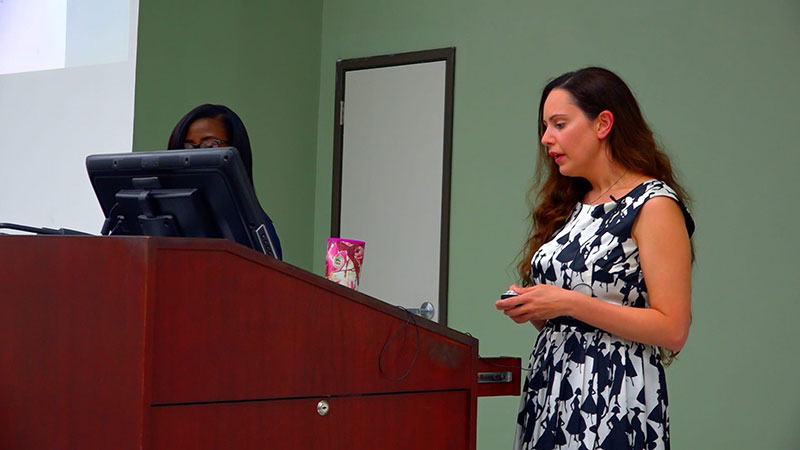The 3rd Research Symposium was held on March 20, 2018 at the Warren Ross Auditorium at the UMHS St. Kitts campus, showcasing oral research and poster presentations by UMHS students. In addition, guest speakers included Dr. Karen Near, a renowned biomedical research physician, and UMHS faculty Dr. Prakash Mungli and Dr. Abrar Khan.
The UMHS Endeavour spoke to Dr. Jane Harrington, UMHS Course Director & Assistant Professor of Microbiology & Medical Research and Committee Chair of the UMHS Research Committee, about the event and how UMHS students continue to work on important new medical research.
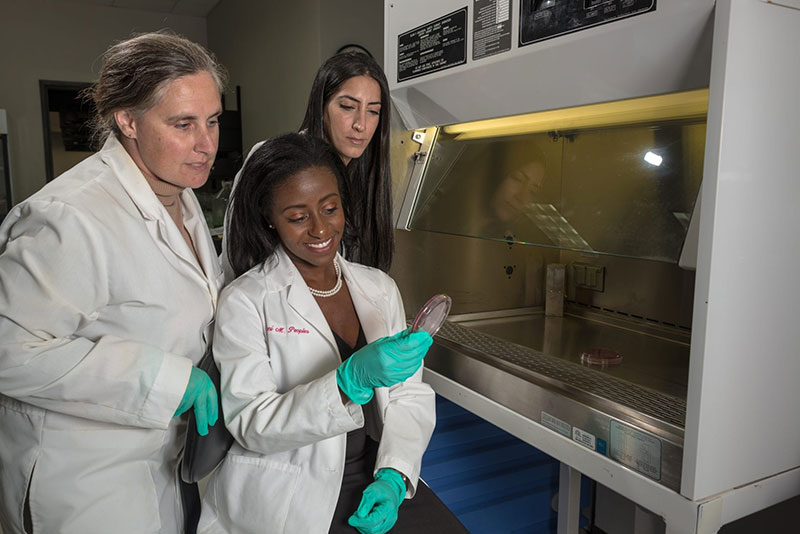
Dr. Jane Harrington (left) with UMHS students in the UMHS Research Lab. Photo: Ian Holyoak
Guest Speaker Dr. Karen Near
Dr. Karen Near spoke on “Careers in Medical Research and What’s Going On Out There.” Dr. Near is well known in biomedical sciences and currently works in the U.S. government for USAID as a Medical Officer in the Microbicides Branch of the Division of Research, Office of HIV/AIDS. What was some of the advice she offered to students who may want to do medical research in the future?
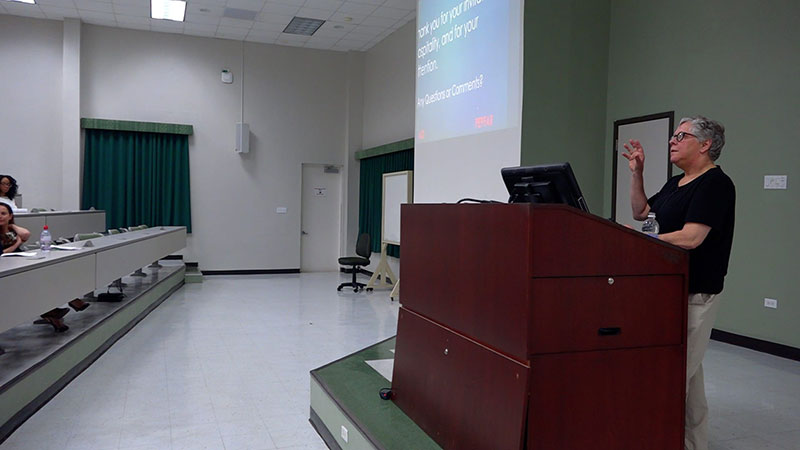
Dr. Karen Near speaks on 'Careers in Medical Research & What's Going On Out There.' Photo: Ian Holyoak
“We were very honored to host Dr. Near for the Keynote Speaker at this year’s Symposium, as she was able to provide a unique perspective coming from the U.S. government and with her background as a physician, bench scientist and world-traveled public health worker,” Dr. Harrington said. “During her talk, she compared medical research careers in academia, industry, pharmaceuticals, biomedical start-ups and government. The best advice she offered for medical students is to get ‘as much education as you can handle, and a continuing love of learning” and to have “a very strong respect for and use of ethics."
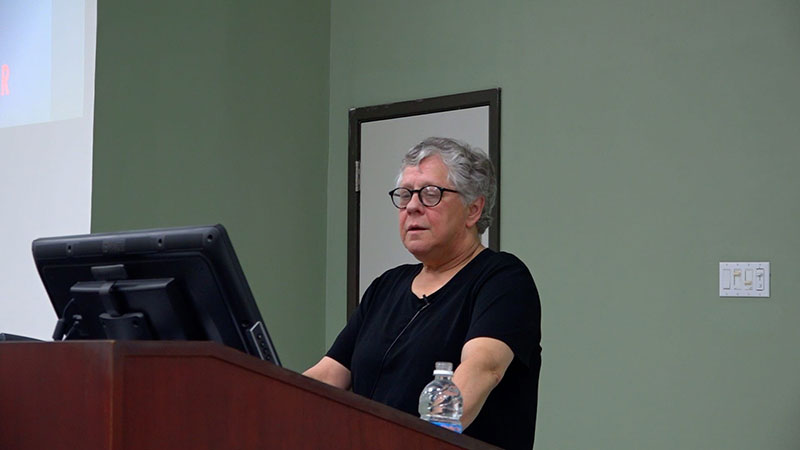
Dr. Karen Near. Photo: Ian Holyoak
Highlights of This Year's Presentations
We spoke to Dr. Harrington about highlights of the Research Symposium Presentations.
“Chronic Hepatitis C Virus in St. Kitts: an Analysis of Prevalence, Risk Factors and Testing Guidelines” by Eboni Peoples and Justine Vella focused on Hepatitis C on the island.
“This project was initiated in response to the new initiative of St Kitts Rotary International to expand Hepatitis C testing and to aim for elimination,” she said. “The most striking finding of the literature review search was how little information is available for St. Kitts. Eboni was able to do a comparative analysis on the published data on Hepatitis C and Hepatitis C: HIV co-infection for analogous Caribbean islands of Puerto Rico, Cuba and Jamaica. Identification of major risk factors and target populations will provide the local Rotary Club to tailor their testing efforts.”
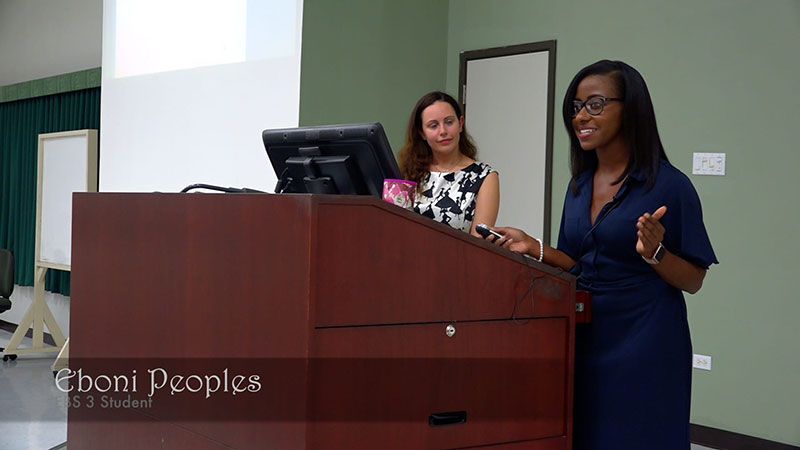
Eboni Peoples at the 3rd UMHS Research Symposium. Photo: Ian Holyoak
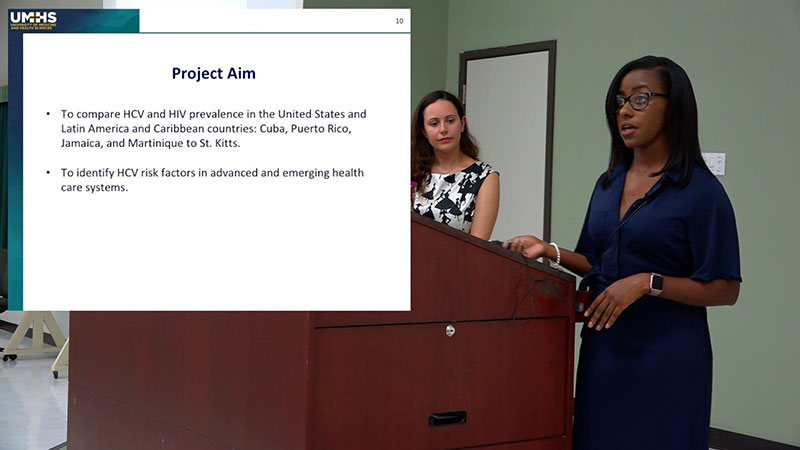
Eboni Peoples & Justine Vella giving their presentation. Photo: Ian Holyoak
Fernando Velez gave a presentation on “Methicillin-resistant Staphylococcus aureus (MRSA) Isolated from Surfaces After Clinical Simulation at a Caribbean Medical School.”
“The incidence of MRSA is relatively low In St Kitts, as compared to some other countries; however, the greatest challenge locally is the availability of alternative therapeutics if the first drug options are not effective,” Dr. Harrington said.
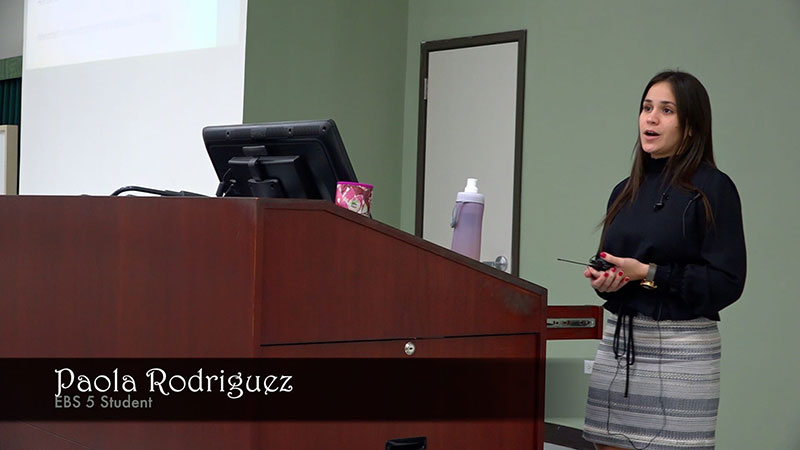
Paola A. Rodriguez Martinez. Photo: Ian Holyoak.
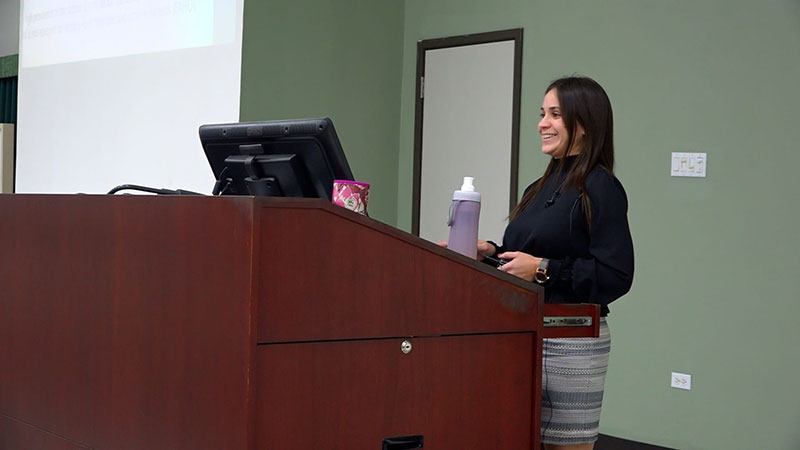
Paola A. Rodriguez Martinez. Photo: Ian Holyoak
Paola A. Rodriguez Martinez gave a presentation on “Development of a Digital Public Health Database to Assess Prevalence of Risk Factors for Non-Communicable Chronic Diseases.”
So what would improve if a database became available?
“Information is always valuable from a public health perspective,” Dr. Harrington said. “With the implementation of the database, the Ministry of Health can compare the demographics of adult Kittians with data collected at health fairs and potentially assess which populations are at greatest risk for developing chronic diseases, such as diabetes and hypertension. Knowing this information can assist with further prevention and intervention efforts. We are excited to present this project at the upcoming CARPHA conference June 14-18 here in St Kitts.” (Please visit http://conference.carpha.org/ for details.)
Dr. Harrington had good things to say about the students’ efforts on the poster presentations.
“Overall, I would like to proudly praise all the effort the students put into the poster presentations,” she said. "I was able to witness the evolution of first, second, third and final poster drafts of students, including individuals who were not enrolled in the Elective. I have extended the opportunity for everyone to enroll in the Elective for the Spring 2018, as each student has demonstrated potential for excellence in research.”
In addition to the student presentations and Dr. Near’s speech, there was also a presentation by other UMHS faculty outside the Research department, including Dr. Prakash Mungli talking about the “Hybrid Classroom” and Dr. Abrar Khan on “Coronary Dominance.” Dr. Mungli is a pioneer at UMHS for novel learner-centered teaching modalities. The data presented at his talk was very suggestive that medical students are open to new methods of learning material, in addition to the standard didactic lecture. Additionally, Dr. Khan challenged conventional thinking of anatomical perspective, pointing out that coronary circulation is dynamic. Individuals have varied phenotypes, including left dominant, right dominant or co-dominant circulation.
Focus on Important Work
The UMHS Research department has really grown in recent years under Dr. Harrington. What are some things current and future UMHS students can expect?
“Given the enthusiastic response from the UMHS community to the Research Symposium, members of the Research Program are discussing ways we can expand to provide research opportunities to more students,” Dr. Harrington said. “One possibility is structuring the Research Elective curriculum to accommodate more literature review research papers, similar to the Hepatitis C and microbiome projects. Another method for expanding the Research Program is to recruit more faculty who might be interested in mentoring students."
Dr. Harrington discussed why research is so important for Caribbean medical schools like UMHS.
“Involvement in research activities is very important to compete for residency positions, regardless of the institution,” she said. “ Although we are in the Caribbean teaching-focused medical school, we can provide students with the similar research opportunities as students in the States to improve their residency applications.”
Below is a full list of Poster Research Presentations.
Poster Research Presentations
Juan Cruz-Echevarría: Antimicrobial and Anti-Biofilm Properties of Indigenous Plants Extracts against Staph aureus
Fabiola A. Rodriguez Gonzalez: Antimicrobial Resistance against Ex-tended-Spectrum Beta-Lactamase of Bacteria Isolated from Chicken and Pork in St. Kitts
Adithi Srinivasiah: A Comparative Analysis of Remission Rates and Length of Stay of Patients with De-Novo AML and Patients with AML with Underlying MDS in a Community Hospital Setting
Jeannie Autry: A Brief Intervention Reduces Perceived Stress among College Students
Venita Uzowulu : Examining the Threshold of Gastrointestinal Microbiota under Chronic Disease to Determine How Dysbiosis Affects the Enteric Nervous System
Fatima Issa: The Role of Microbiota and Its Influence On The Gut-Brain Axis
Johanna Enelus: Addressing the Childhood Obesity Epidemic through Early Preventive Measures
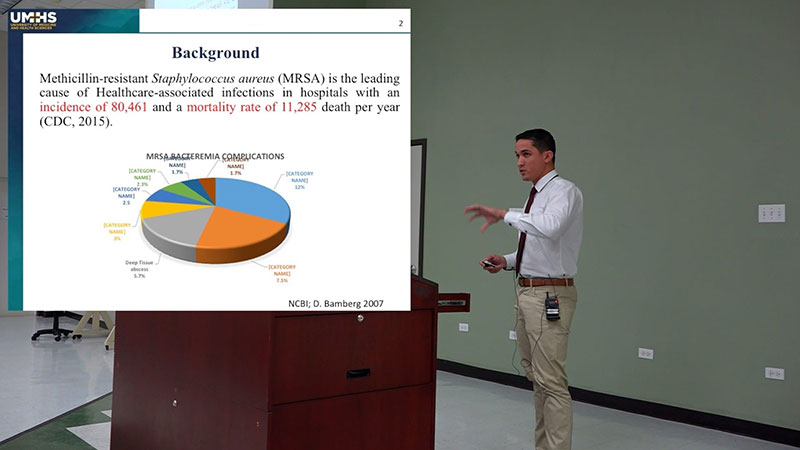
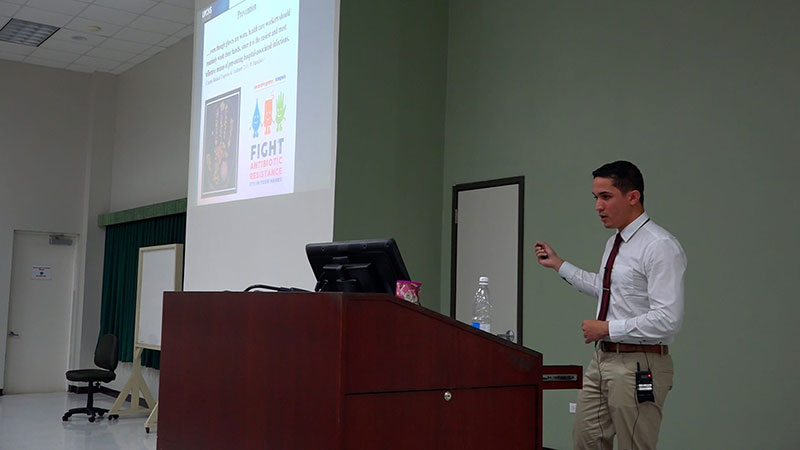
Fernando Velez giving his presentation (two photos above). Photo: Ian Holyoak.
Justine Vella. Photo: Ian Holyoak
Link to Video of the 3rd UMHS Research Symposium
About UMHS:
Built in the tradition of the best US universities, the University of Medicine and Health Sciences focuses on individual student attention, maintaining small class sizes and recruiting high-quality faculty. We call this unique approach, “personalized medical education,” and it’s what has led to our unprecedented 96% student retention rate, and outstanding residency placements across the US and Canada. UMHS is challenging everything you thought you knew about Caribbean medical schools.

Scott is Director of Digital Content & Alumni Communications Liaison at UMHS and editor of the UMHS Endeavour blog. When he's not writing about UMHS students, faculty, events, public health, alumni and UMHS research, he writes and edits Broadway theater reviews for a website he publishes in New York City, StageZine.com.













